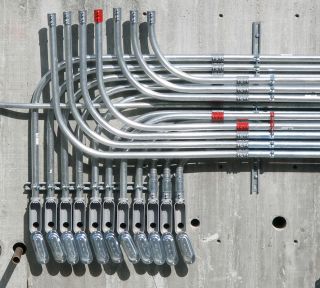October 18, 2005
Making connections

Yesterday I had lunch with my friend who just returned from volunteering for a week in Gulfport, Mississippi. She was particularly impressed by the North Carolina Baptist Men (once she got over their name). She said they were, forgive the phrase, a godsend. The Men have outfitted trailers that they drive to disaster areas. In additon to "feeding units" , they have one that is fitted with six showers each for men and women (no coed showers, understandably). Another trailer has a bunch of washing machines and dryers which are manned and operating twenty four hours a day, so that volunteers and victims can have clean clothing. Let the North Carolina Baptist Men stand as a shining example of the kind of cooperation, planning and mutual regard that is needed in communities when preparing for the possibility of a pandemic.
Peter Sandman writes that we must focus on much more than pharmaceutical interventions when planning for a pandemic. Here are but a few of his suggestions:
". Manufacturers and service providers can rethink their inventory control procedures. What will they be able to provide for themselves if their usual supplier can no longer make it or ship it? What can they do without in a pinch? What do they need to stockpile?
. Every organization can rethink its staffing needs. How can we get essential tasks done despite soaring absenteeism? What sorts of cross-training now might save the day later?
. Every organization can rethink its social contact needs. Infectious disease transmission is a function of the number of social contacts — keeping people home more means keeping more of them alive. What jobs can shift to telecommuting? How can we educate children without making them come to school? How can we distribute food without making people come to the supermarket or the soup kitchen? Should we redefine “delivery person” as an essential job that qualifies for prophylactic antivirals?
. Nonprofits can start planning to coordinate volunteers. Like any emergency, a pandemic will yield huge numbers of people who want to do something to help — including many who contracted pandemic influenza and survived, and are therefore immune. Who is going to sort them out and get them where they’re needed most, doing high-risk jobs that don’t require special skills (washing linens at the hospital, for example, or making deliveries to people sick at home)?
. Local governments can ask themselves hard questions about leadership and survival. How will they keep essential services (police, fire, water and sewerage) operating? What inessential sources of infection (movie theaters and restaurants, for example) will they want to shut down? Where will they put the bodies when the morgues are full? How will they maintain order?
. What’s left for individuals to do? Inculcate hand hygiene habits now. Figure out how you’ll take care of a sick family member without getting everyone else sick. Stockpile what you’ll need so you don’t need to go out so much. Ask your doctor for a prescription for Tamiflu or Relenza ... and fill it fast, before the drugstores run out. (Admittedly, this is a zero-sum game by now.) Above all, push every organization you’re tied to — your church, your employer, your club, your children’s school — to start its own pandemic planning process."
Australia's Community Resiliance Network which is up and running, is considering ways to implement "social distancing" effectively. Social distancing means keeping folks apart during a pandemic so they do not infect one another. Articles consider the implications of closing schools, public gathering and work places, and the possiblitiy of restructuring mortages to allow citizens to take time away from work. Questions are raised like how will physicans practice and pharmacists distribute medicine? Who will care for children during a pandemic when their parents are ill, or, god forbid, dead?
A Resilience Wiki has been created. There are vast holes to be filled, but the structure is there to facilitate connection..
And on a global scale, we might begin to think about curing poverty as a way to stop the emergence of biological threats.
Anyway, as I consider distributing a preparedness flier in my neighborhood on Halloween, and try to decide between doing so in my Big Bird outfit or my Contamination Suit Ensemble, I find myself yearning to be a man and a Baptist, where it would be all organized for me.
Photo note: Shot on a construction site where the pipes are all in place, ready to be connected.
Posted by Dakota at October 18, 2005 06:42 AM